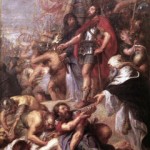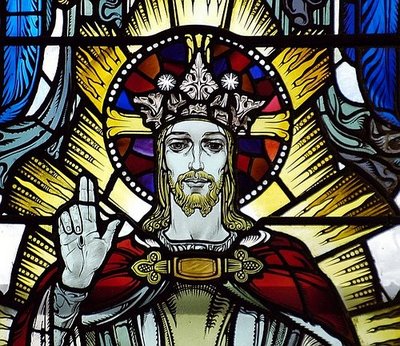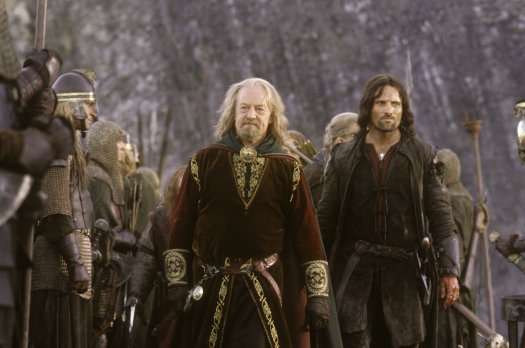 Back in the beginning, all of the titles for posts answered the statement of the blog title, “Why I Am Catholic.” And so it is again for this post, because our time here on earth is like the stories of old, only with a different cast of characters. And these days, dear reader, you are no longer a spectator as when you were a child, but you are a participant, willingly or no.
Back in the beginning, all of the titles for posts answered the statement of the blog title, “Why I Am Catholic.” And so it is again for this post, because our time here on earth is like the stories of old, only with a different cast of characters. And these days, dear reader, you are no longer a spectator as when you were a child, but you are a participant, willingly or no.
But perhaps you haven’t heard the stories, or bothered to read them. Oh, I’m getting ahead of myself. First, the line in the title above is spoken by the hobbit Samwise Gamgee to his heavily burdened friend, Frodo Baggins. For those of you short on Tolkien knowledge, here’s a clip from The Lord of the Rings: The Two Towers, to bring you up to speed.
What brought this scene to my mind were the words from scripture readings, from 1 Maccabees. I read this particular story to the congregation this time last year. As I familiarized myself with the passage, what came to my mind was Aragorn of Gondor going to town against Sauron’s minions. Or Kenneth Branagh doing Henry V. I’ll share the scripture passage in a second, but you need to know some more background information first.
At the time, I had just finished reading Joe Carter’s post over on First Things, see? It’s called How to Restore the Culture in One Easy Step. What’s the step? Reading the Bible, the cornerstone of Western Civilization. Here’s a taste,
One of the most significant cultural disasters in the West is the loss of biblical literacy. From the Middle Ages to the twentieth century, the Bible was the bedrock for our culture’s shared heritage. The term culture comes from the Latin cultura, meaning “to plow” or “to till,” and for centuries, the Bible was the rich loam our civilization would plow. The Old and New Testaments provided the fertile soil in which the Western literary imagination took root, and from the scriptural terra firma grew the metaphors, allusions, narratives, and archetypes that fed the soul of our civilization.
Ow…that dude can write! You’ll want to read the rest, for sure.
I couldn’t agree more, and it’s one of the reasons why I love being Catholic. Besides just picking up the Bible and randomly picking a book and page to read (worked for St. Augustine; works for me!), there’s also set Daily Readings, and the Liturgy of the Hours to help you build your house on solid rock. I even came up with a reading plan, with a little help from St. Bernard.
The passage I read at Mass that day is the kind that gets some folks embarassed, and others motivated. It’s got sturm und drang completely covered. And speech wise, the hero of the piece, one Mattathias? Let’s just say I’m picturing Lee Van Cleef in the role.
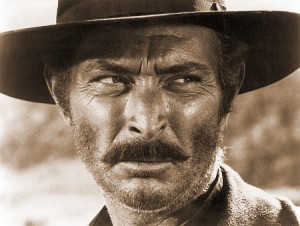
Here goes with the passage. First, the setting:
The officers of the king in charge of enforcing the apostasy came to the city of Modein to organize the sacrifices. Many of Israel joined them, but Mattathias and his sons gathered in a group apart.
You see, the Greeks ran the show in Palestine at the time. You thought the Romans were hard core? Under Antiochus IV, the Greeks conquered the land and subdued those before them. Remember from history how the Spaniards treated the native Aztecs when they came to the New World? It was a lot like that. The enlightened conquerors even brought their idols into the Temple, for good measure, demanding everyone make sacrifices to their empty gods. That’s what “enforcing the apostasy” meant. Mattathias and his followers were having none of it.

So the big-wig, muy importante, herald and agent of the Greek king had an idea for winning Mattathias over.
Then the officers of the king addressed Mattathias: “You are a leader, an honorable and great man in this city, supported by sons and kin. Come now, be the first to obey the king’s command, as all the Gentiles and the men of Judah and those who are left in Jerusalem have done. Then you and your sons shall be numbered among the King’s Friends, and shall be enriched with silver and gold and many gifts.”
The usual stuff of apostasy, right. “Hey man, nothing to be alarmed at. Just recant your fidelity to your god (whatever!) and chill. I’ll even sweeten the deal for you with temporal goodies. Um-kay? Everything will be cool.”
Check what happens next.

But Mattathias answered in a loud voice: “Although all the Gentiles in the king’s realm obey him, so that each forsakes the religion of his fathers and consents to the king’s orders, yet I and my sons and my kin will keep to the covenant of our fathers. God forbid that we should forsake the law and the commandments. We will not obey the words of the king nor depart from our religion in the slightest degree.”
Can you say, “not gonna happen?” When reading this to the congregation, it was all I could do not to get all dramatic on them. Re-read that! It’s awesome stuff. Joe Carter is right. Knowledge of passages such as this one have inspired countless authors of heroic fiction, including J.R.R. Tolkien, and many others.
Ready for “Inconvenient Scriptures” time? Folks who only like their Christians as milquetoast eating, spineless, bootlicks of “the man,” will cluck their tongues and shake their heads in sad disappointment at this next section of the passage. You see, Mattathias is going to become an agent of God’s justice. Most of us modern folks, comfortable in our tidy suburban dwellings and mostly trouble-free lives, get all squiggly in the pews over what happens next.
As he finished saying these words, a certain Jew came forward in the sight of all to offer sacrifice on the altar in Modein according to the king’s order.
Rut-ro, Raggy (bold highlights are mine).
When Mattathias saw him, he was filled with zeal; his heart was moved and his just fury was aroused; he sprang forward and killed him upon the altar. At the same time, he also killed the messenger of the king who was forcing them to sacrifice, and he tore down the altar. Thus he showed his zeal for the law, just as Phinehas did with Zimri, son of Salu.
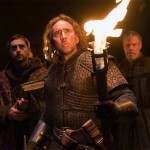 Perhaps now, instead of Lee Van Cleef, Mattathias is being played by Nicholas Cage in one of his trademark, going berserk, screen filling rages. The congregation is sitting on the edge of their seats now. One last time, I try to bring Mattathias to life as he rallies the faithful to remain loyal to the One True King.
Perhaps now, instead of Lee Van Cleef, Mattathias is being played by Nicholas Cage in one of his trademark, going berserk, screen filling rages. The congregation is sitting on the edge of their seats now. One last time, I try to bring Mattathias to life as he rallies the faithful to remain loyal to the One True King.
Then Mattathias went through the city shouting, “Let everyone who is zealous for the law and who stands by the covenant follow after me!” Thereupon he fled to the mountains with his sons, leaving behind in the city all their possessions. Many who sought to live according to righteousness and religious custom went out into the desert to settle there.
Back to The Lord of the Rings, doesn’t that scene remind you of when all the troops headed to the stronghold at Helms Deep? And it also reminds me of what Tolkien’s brave little hobbit, Samwise, said in his speech above: “By all rights, we shouldn’t even be here.”
And yet, as Fr. Barron explained in the episode of Catholicism regarding Christ’s teachings on non-violence, the Church recognizes that sometimes, the just war option is all that is left to ensure that Hope does not perish from the face of the earth. Sure, maybe we don’t want to be there, but sometimes that is precisely where God wills we must go.
Is this then a green light for us to become the next iteration of the Maccabean Uprising? No. But the great stories have a lesson to teach us about being steadfast and persevering in the Faith. That’s why they are included in the Canon of Scriptures. When I read this last year, the Old Testament readings had been from these great books of Maccabees. Thrown to the wayside by Martin Luther, what inspiration these “great stories” provide to us! In our old darkness is new modern age, where Gnostic ideas ever creep up to tempt Christians to not hold fast to our traditions (“Psst, who cares? Tell Caesar what he wants to hear, and then say a little prayer to God. All is well!”), you know, in order to get along with the culture of “the world,” these stories remind us that apostasy is not to be taken lightly. In fact, it is to be avoided at all costs. How else does one make it into the Kingdom of Heaven?
Hebrews 11:26-40 Esteeming the reproach of Christ greater riches than the treasure of the Egyptians. For he looked unto the reward. By faith he left Egypt, not fearing the fierceness of the king: for he endured as seeing him that is invisible. By faith he celebrated the pasch, and the shedding of the blood; that he, who destroyed the firstborn, might not touch them. By faith they passed through the Red Sea, as by dry land: which the Egyptians attempting, were swallowed up. By faith the walls of Jericho fell down, by the going round them seven days. By faith Rahab the harlot perished not with the unbelievers, receiving the spies with peace. And what shall I yet say? For the time would fail me to tell of Gideon, Barac, Samson, Jephthe, David, Samuel, and the prophets: Who by faith conquered kingdoms, wrought justice, obtained promises, stopped the mouths of lions, Quenched the violence of fire, escaped the edge of the sword, recovered strength from weakness, became valiant in battle, put to flight the armies of foreigners: Women received their dead raised to life again. But others were racked, not accepting deliverance, that they might find a better resurrection. And others had trial of mockeries and stripes, moreover also of bands and prisons. They were stoned, they were cut asunder, they were tempted, they were put to death by the sword, they wandered about in sheepskins, in goatskins, being in want, distressed, afflicted: Of whom the world was not worthy; wandering in deserts, in mountains, and in dens, and in caves of the earth. And all these being approved by the testimony of faith, received not the promise; God providing some better thing for us, that they should not be perfected without us.
Hebrews 12
And therefore we also having so great a cloud of witnesses over our head, laying aside every weight and sin which surrounds us, let us run by patience to the fight proposed to us: Looking on Jesus, the author and finisher of faith, who having joy set before him, endured the cross, despising the shame, and now sitteth on the right hand of the throne of God. For think diligently upon him that endured such opposition from sinners against himself; that you be not wearied, fainting in your minds.
The great story is, as Tolkien explained to Jack Lewis, His story. And we have to make it ours too. Joe Carter’s post reminds us that the great artists, writers, and thinkers to emerge from the chaos of the collapsed pagan empires of Greece and Rome, have all been inspired by the scriptures. Because the truth of the Holy Spirit inspired words therein are indeed the wellspring of inspiration.
Here’s an example from the mind of Friedrich Handel. The little scene I shared with you from Maccabees above? Yes siree, he put it to music. Have a look and listen,
So the next time you go starting to think that this being a Christian thing is way too hard, because you’re going to offend some people, remember the great stories. But you have to have read them in order to recognize the patterns of fallenness that they warn us of. Forewarned is forearmed, as the wise saying goes.
And if you ever doubt the positions the Church stands for, say on abortion, marriage, divorce, or her doctrines, are really worth risking your life over, remember this as well:
And I say to you, my friends: Be not afraid of them who kill the body, and after that have no more that they can do. Whosoever shall seek to save his life, shall lose it: and whosoever shall lose it, shall preserve it.
UPDATE
“Speaking to a culture hungry for truth and for something worth fighting for.”

